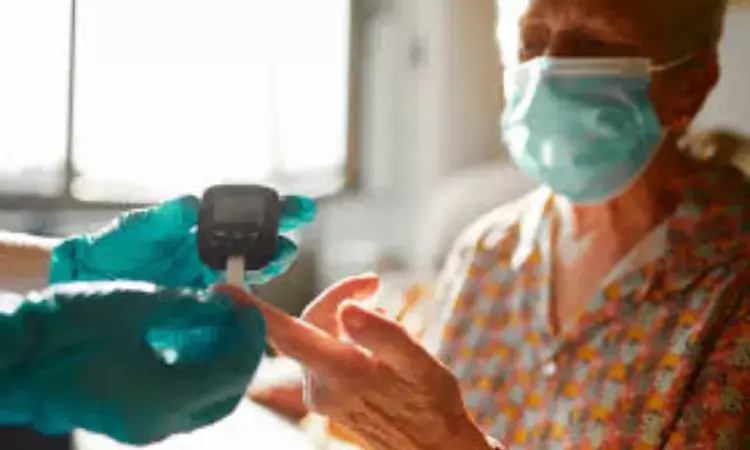- Home
- Medical news & Guidelines
- Anesthesiology
- Cardiology and CTVS
- Critical Care
- Dentistry
- Dermatology
- Diabetes and Endocrinology
- ENT
- Gastroenterology
- Medicine
- Nephrology
- Neurology
- Obstretics-Gynaecology
- Oncology
- Ophthalmology
- Orthopaedics
- Pediatrics-Neonatology
- Psychiatry
- Pulmonology
- Radiology
- Surgery
- Urology
- Laboratory Medicine
- Diet
- Nursing
- Paramedical
- Physiotherapy
- Health news
- Fact Check
- Bone Health Fact Check
- Brain Health Fact Check
- Cancer Related Fact Check
- Child Care Fact Check
- Dental and oral health fact check
- Diabetes and metabolic health fact check
- Diet and Nutrition Fact Check
- Eye and ENT Care Fact Check
- Fitness fact check
- Gut health fact check
- Heart health fact check
- Kidney health fact check
- Medical education fact check
- Men's health fact check
- Respiratory fact check
- Skin and hair care fact check
- Vaccine and Immunization fact check
- Women's health fact check
- AYUSH
- State News
- Andaman and Nicobar Islands
- Andhra Pradesh
- Arunachal Pradesh
- Assam
- Bihar
- Chandigarh
- Chattisgarh
- Dadra and Nagar Haveli
- Daman and Diu
- Delhi
- Goa
- Gujarat
- Haryana
- Himachal Pradesh
- Jammu & Kashmir
- Jharkhand
- Karnataka
- Kerala
- Ladakh
- Lakshadweep
- Madhya Pradesh
- Maharashtra
- Manipur
- Meghalaya
- Mizoram
- Nagaland
- Odisha
- Puducherry
- Punjab
- Rajasthan
- Sikkim
- Tamil Nadu
- Telangana
- Tripura
- Uttar Pradesh
- Uttrakhand
- West Bengal
- Medical Education
- Industry
Improper glycemic control in diabetes patients tied to higher risk of hypertension

China: A recent study published in BMC Cardiovascular Disorders has revealed an association between insufficient glycemic control and a higher risk of hypertension among patients with diabetes.
The researchers noted that the effect of glycemic control on hypertension was more pronounced in people with depressive symptoms and lower educational attainment. The findings highlight the significance of educational background considerations, vigilant glycemic monitoring, and mental health assessments in managing diabetes patients.
The other meaningful finding of the study was that diabetes with insufficient glycemic control and depressive symptoms had a significantly higher risk of developing hypertension; implying that mental health may influent the association between glycemic control and hypertension.
"Our finding indicates that mental health should be part of diabetes management, and a psychotherapist or psychiatrist should be included in the diabetes management team," the researchers wrote.
Previous studies have shown that diabetes raises the risk of hypertension morbidity, but there is no information on whether this association varied with glycemic control. Shengliang Chen, Sun Yat-sen University, Guangzhou, Guangdong, P. R. China, and colleagues aimed to examine the association between glycemic control and hypertension among middle-aged and older Chinese with diabetes.
For this purpose, the researchers extracted data from the China Health and Retirement Longitudinal Study (CHARLS) between 2011 and 2018. Participants were categorised as having inadequate glycemic control (HbA1c ≥ 7%) and adequate glycemic control (HbA1c < 7%) by combining blood glucose tests and physician’s diagnoses in 2011.
Incident hypertension was determined through self-reported physician diagnoses from 2011 to 2018. The effect of glycemic control on hypertension was examined using Cox proportional hazards regression models.
According to the researchers, the study is the first population-based cohort study to explore the association between glycemic control and hypertension among those with diabetes in China.
The study revealed the following findings:
· Among 436 participants with diabetes in this study, 102 met the glycemic control standard, and 334 had insufficient glycemic control.
· During 7 years of follow-up, 141 individuals developed hypertension.
· Compared with adequate glycemic control, the hazard ratio of inadequate glycemic control on hypertension was 1.54 in the multivariate model.
· The influence of glycemic control on hypertension varied based on educational attainment and the presence of depressive symptoms.
"Although there is no clarity on the mechanisms, the results suggest that the change in HbA1c might play a direct role in raising the blood pressure through other mechanisms that are not entirely produced by weight gain; highlighting the importance of long-term monitoring of HbA1c levels," the researchers concluded.
Reference:
Chen, S., Zhu, Y., Jin, S. et al. Association of glycemic control with hypertension in patients with diabetes: a population-based longitudinal study. BMC Cardiovasc Disord 23, 501 (2023). https://doi.org/10.1186/s12872-023-03478-3
Dr Kamal Kant Kohli-MBBS, DTCD- a chest specialist with more than 30 years of practice and a flair for writing clinical articles, Dr Kamal Kant Kohli joined Medical Dialogues as a Chief Editor of Medical News. Besides writing articles, as an editor, he proofreads and verifies all the medical content published on Medical Dialogues including those coming from journals, studies,medical conferences,guidelines etc. Email: drkohli@medicaldialogues.in. Contact no. 011-43720751


